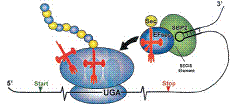Biochemistry, Department of

Vadim Gladyshev Publications
Document Type
Article
Date of this Version
December 2005
Abstract
Selenocysteine (Sec) is found in active sites of several oxidoreductases in which this residue is essential for catalytic activity. However, many selenoproteins have fully functional orthologs, wherein cysteine (Cys) occupies the position of Sec. The reason why some enzymes evolve into selenoproteins if the Cys versions may be sufficient is not understood. Among three mammalian methionine-R-sulfoxide reductases (MsrBs), MsrB1 is a Sec-containing protein, whereas MsrB2 and MsrB3 contain Cys in the active site, making these enzymes an excellent system for addressing the question of why Sec is used in biological systems. In this study, we found that residues, which are uniquely conserved in Cys-containing MsrBs and which are critical for enzyme activity in MsrB2 and MsrB3, were not required for MsrB1, but increased the activity of its Cys mutant. Conversely, selenoprotein MsrB1 had a unique resolving Cys reversibly engaged in the selenenylsulfide bond. However, this Cys was not necessary for activities of either MsrB2, MsrB3, or the Cys mutant of MsrB1. We prepared Sec-containing forms of MsrB2 and MsrB3 and found that they were more than 100- fold more active than the natural Cys forms. However, these selenoproteins could not be reduced by the physiological electron donor, thioredoxin. Yet, insertion of the resolving Cys, which was conserved in MsrB1, into the selenoprotein form of MsrB3 restored the thioredoxin-dependent activity of this enzyme. These data revealed differences in catalytic mechanisms between selenoprotein MsrB1 and non-selenoproteins MsrB2 and MsrB3, and identified catalytic advantages and disadvantages of Sec- and Cys-containing proteins. The data also suggested that Sec- and Cyscontaining oxidoreductases require distinct sets of active-site features that maximize their catalytic efficiencies and provide strategies for protein design with improved catalytic properties.


Comments
Published by PLoS Biology | December 2005 | Volume 3 | Issue 12. Copyright © 2005 Kim and Gladyshev. Permission to use. www.plosbiology.org.